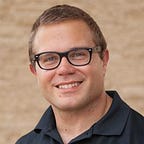Writing Online Fiction Saved My Life
 Once upon a time, I was all alone in my pain.
Once upon a time, I was all alone in my pain.
Except, as Joanna Schroeder recently described, I wasn’t alone at all. In fact, over 20 million American men experience sexual abuse during childhood, just as I did.
In 1996, I became the unnamed minor in a high-profile child molestation case, and ended up remanded to the care of my uncle. Already isolated before these events occurred, I responded by temporarily dropping out of high school and vanishing from view. Although I was close to my uncle and two cousins, I lacked a vocabulary for addressing these traumatic events with them. And aside from a few visits with court-appointed psychologists that ceased when the molestation charges were dismissed, I received no formal therapy.
Ed Muskie’s tears derailed his 1972 campaign for president, and the emotional world inhabited by men had changed little in the ensuing two decades, particularly in the rural, backward area from which I hailed. Men didn’t cry, and they certainly didn’t talk about sensitive issues like being abused. In lieu of substantive discussion, I found only silence. I personally knew no men who would admit to being victimized, nor was I cognizant of any prominent, Tyler Perry-caliber role models attempting to raise awareness about the subject.
Ideally, I’d have found a subject-specific support group, online or otherwise, and discussed my experiences with other survivors. But the Internet was still in its infancy in the mid 1990s. Instead of seeking direct assistance, I became deeply involved in a community of people who wrote fan fiction about professional wrestling (i.e., “e-wrestling”). What resulted from that, besides a great deal of forgotten junk literature, was soul-baring catharsis.
Alongside a circle of internet friends, I used online storytelling to process and eventually understand the most troubled period of my life.
My older cousin introduced me to e-wrestling in early 1996, and encouraged me to join the “e-federation” to which he belonged. I soon immersed myself in the e-wrestling universe: I joined other federations, a message board, and various Internet Relay Chat (IRC) channels.
Through the IRCs, I got to know other writers on a more personal level. The production of fictional wrestling matches often took a backseat to the cultivation of deep and involved relationships. During the course of our long, text-based conversations, friends disclosed intimate and sometimes tragic details of their lives. Stories about abusive parents, mentally disturbed exes, crippling illnesses, and ruined finances made me realize that I wasn’t the only person dealt a rotten hand.
E-wrestling likely peaked in user participation around 1998, but I continued my involvement with the community until 2003. I had created a character, Eddy “Flap” Jacks, modeled on my obese, foul-mouthed father, an aging former pro football player unable to deal with his many past failures. For reasons I understood only dimly at the time, I eventually gave him a son, Eddy Jacks Jr., a weak-willed aspiring bodybuilder (another long-time avocation of mine) and perpetual disappointment to his father.
Through the Jacks Sr./Jacks Jr. relationship, I began exploring issues I would later examine more extensively with the aid of a therapist. The elder Jacks was a violent maniac who had brutalized his son’s mother, yet Jacks Jr. continued to idolize his father because he possessed the masculine bona fides that Jr. lacked. Jacks Sr.’s dialogue was taken verbatim from my father’s own descriptions of me, with lines such as “the only thing that boy plays is the skin-flute” and “my son could screw up a wet dream or a one-car funeral.”
Yet Eddy Jacks Sr., manly bluster aside, was a fundamentally tragicomic character, a pathetic has-been at the tail end of a mostly unmemorable wrestling career. I ostensibly wrote about the tandem to score cheap laughs, but I was really trying to come to terms with the fact that my father, who had terrorized me throughout my childhood, was little more than a bitter, insecure loser. Though he ridiculed his son to make himself feel better, the joke was always on him, with Jacks Jr. there to watch and offer wry comment as his father’s best-laid plans went south.
As my own time in e-wrestling drew to a close, I began reestablishing myself in the world. I socialized more frequently and made other friends. I went to law school and passed the bar exam. I went to grad school and (eventually) became a professor. I started therapy, took medication, practiced meditation.
“You can own your pain or be alone in your pain,” one of my first full-time therapists told me. This line, like any line that rhymes, is undeniably cheesy — mawkish, even. Yet it’s also true. The quieter and lonelier I was, and the less I said about the hurts that gnawed at me, the worse I felt.
E-wrestling was far from the perfect solution to what ailed me, but I discovered this ad hoc writing community at the perfect time. It wasn’t a formal support group, but it was a safe place to begin seeking support. Fiction, particularly this sort of anonymous and largely unnoticed genre fiction, enabled me to address issues that I couldn’t then have brought myself to approach in any other way.
As an adult, I’ve continued writing Eddy Jacks stories. The Jackses, though known to almost no one outside of the e-wrestling world, still bulk larger in my imagination than any of the book projects I’m currently developing. Through them, I shared myself with the world at a time when I felt lost and vulnerable.
The act of sharing oneself with others is, of course, merely a first step. Just-so stories about overcoming some terrible thing are incomplete at best, fraudulent at worst. The process of recovery is never-ending.
Yet there has to be a starting point, a moment when the victim can offer his or her truth to the world without fear of recrimination. Eventually I was strong enough to seek professional help — to “own my pain,” as it were — but first I had to find a way to help myself.
E-wrestling, to put the matter bluntly, was how I started saving my life.
